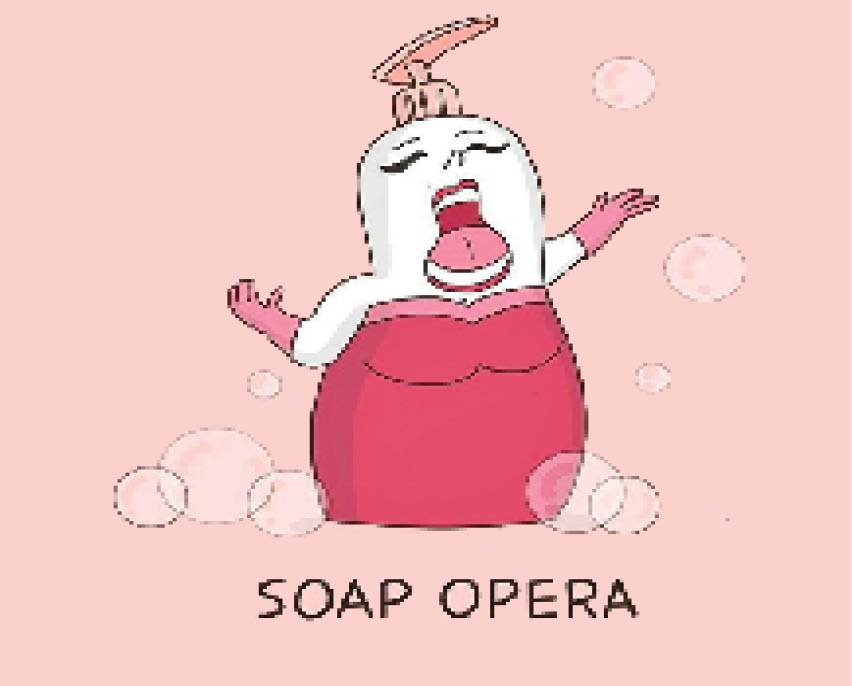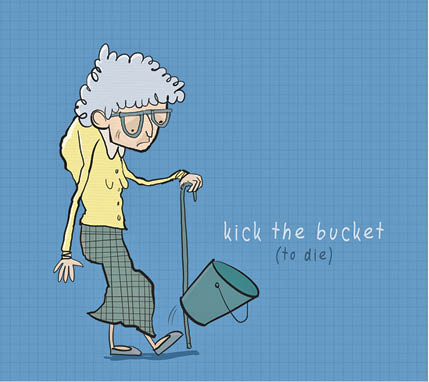As we know, Idioms are sometimes silly, sometimes funny but quite often they induce reflection. In our earlier articles, we have shared many idioms dealing with ghosts and death. Here are few more in the same vein…

 Die hard: Today, influenced by the movie ‘Die Hard’ starring Bruce Willis, the idiom has taken a different connotation. It refers to a person of strong character, a tough man, one who cannot be defeated, he is usually a good guy who cannot be killed by the bad guys. Originally it used to be referred to a man who was condemned to death by hanging. Tyburn, which is situated near the Marble Arch of the present day London was famous, or rather infamous for being place for execution of persons condemned to death by hanging. The New Drop method (Long drop method) was not introduced till 1872. The Old Short Drop method was painful and the condemned person died after a long bout of suffering. They would ‘die hard’. Those who did not wish to die thus, would pay a person to hang upon their legs so that they would die quickly without much suffering. Those who did not pay met a painful death – the die-hards. Thus a person who holds tenaciously to the old views, to lost causes, vigorously resisting any change is a die-hard person. Today the meaning has moved away from its association with death.
Die hard: Today, influenced by the movie ‘Die Hard’ starring Bruce Willis, the idiom has taken a different connotation. It refers to a person of strong character, a tough man, one who cannot be defeated, he is usually a good guy who cannot be killed by the bad guys. Originally it used to be referred to a man who was condemned to death by hanging. Tyburn, which is situated near the Marble Arch of the present day London was famous, or rather infamous for being place for execution of persons condemned to death by hanging. The New Drop method (Long drop method) was not introduced till 1872. The Old Short Drop method was painful and the condemned person died after a long bout of suffering. They would ‘die hard’. Those who did not wish to die thus, would pay a person to hang upon their legs so that they would die quickly without much suffering. Those who did not pay met a painful death – the die-hards. Thus a person who holds tenaciously to the old views, to lost causes, vigorously resisting any change is a die-hard person. Today the meaning has moved away from its association with death.
 Kick the Bucket: To die. This is a very euphemistic British way of saying someone has died. This idiom is rather a dark origin. It refers to someone committing suicide by standing upon a bucket putting a noose around his neck and then kicking away the bucket.
Kick the Bucket: To die. This is a very euphemistic British way of saying someone has died. This idiom is rather a dark origin. It refers to someone committing suicide by standing upon a bucket putting a noose around his neck and then kicking away the bucket.
To Hand in the Dinner Pail: A dinner pail is a small container in which the labourers and school children carry their meals. To hand in or give up the pail, this again, like ‘Kick the bucket’ means to die. P G Wodehouse has very often used this phrase
Jaws O Death: This phrase indicate escape from potential injury or even death. The oldest reference to this phrase is found in Shakespeare’s Twelfth Night, “This youth that you see here I snatch’d one half out of the jaws of death.” It became more popular in the poem by Alfred, Lord Tennyson in his poem “The Charge of the Light Brigade” wherein he writes, “Into the jaws of death, into the mouth of hell, rode the six hundred.”
 Ghost town: An abandoned town or a town without any prospect of economic development. The term probably started in US during the days of gold-rush when towns came up rather quickly as the gold prospectors made a beeline for these places. When the source of gold diminished or completely dried up they moved our leaving Ghost-Towns as eerie and isolated memorials of history.
Ghost town: An abandoned town or a town without any prospect of economic development. The term probably started in US during the days of gold-rush when towns came up rather quickly as the gold prospectors made a beeline for these places. When the source of gold diminished or completely dried up they moved our leaving Ghost-Towns as eerie and isolated memorials of history.
Yield the Ghost: this is the same as ‘to give up the ghost’ i.e. to die. One would say ghost is an after death phenomenon so how would giving or yielding the ghost mean to die. During the Middle Ages ghost meant soul as we it understand today.
 Now let us move a bit away from the morbid subject of death and scary topic of ghosts. Right! I’ll drink to that. OK! Drinking has given a beautifully happy touch to languages. Words have stepped over from one language to another making very interesting phrases and idioms. Thanks to the hooch that we have the German drinking songs, all loud, happy and boisterous, and words like tumblers, speakeasies, pehli-dhar, bottoms-up, mud in your eye, salut, prosit and the very word hooch. The list is endless. Surprisingly the word hooch comes from the far off frozen north, of US of America, Alaska. Alaska was the Russian territory and it was bought over by the United States for about seven million dollars in 1876. Liquor was not easily available here. The US soldiers who were posted there found a way to distil their own stuff, a concoction of molasses and berries found locally, with sugar and yeast. They also used to trade this liquor with the Hoochino tribe. The Hoochinos were so fond of this distillate that they started to distil it too. During the period of the Great Gold Rush, the miners who came to prospect in that region, took to it with great fondness. They called it ‘hoochino’ which later became shortened to Hooch or what we call in India call ‘the country liquor’.
Now let us move a bit away from the morbid subject of death and scary topic of ghosts. Right! I’ll drink to that. OK! Drinking has given a beautifully happy touch to languages. Words have stepped over from one language to another making very interesting phrases and idioms. Thanks to the hooch that we have the German drinking songs, all loud, happy and boisterous, and words like tumblers, speakeasies, pehli-dhar, bottoms-up, mud in your eye, salut, prosit and the very word hooch. The list is endless. Surprisingly the word hooch comes from the far off frozen north, of US of America, Alaska. Alaska was the Russian territory and it was bought over by the United States for about seven million dollars in 1876. Liquor was not easily available here. The US soldiers who were posted there found a way to distil their own stuff, a concoction of molasses and berries found locally, with sugar and yeast. They also used to trade this liquor with the Hoochino tribe. The Hoochinos were so fond of this distillate that they started to distil it too. During the period of the Great Gold Rush, the miners who came to prospect in that region, took to it with great fondness. They called it ‘hoochino’ which later became shortened to Hooch or what we call in India call ‘the country liquor’.
 We will continue on the subject of this hoochie gift of the Happy Hour. Till then Prosit, Salut,-hic- Tchin-tchin and all that sort of rot. “Hello, hello…….ha-ji madam editor, please aye time-e na phone karo. My wife says sara-saat pachi maru bheju thekan-e nathi hotu…… Hic!”
We will continue on the subject of this hoochie gift of the Happy Hour. Till then Prosit, Salut,-hic- Tchin-tchin and all that sort of rot. “Hello, hello…….ha-ji madam editor, please aye time-e na phone karo. My wife says sara-saat pachi maru bheju thekan-e nathi hotu…… Hic!”
- 48 And Still Going… Er… Um.. Strong! - 8 February2025
- Parsis – The Sweetest Bunch! - 28 December2024
- Hep Grannies, Swingin’ Grandpas!’ - 10 August2024
